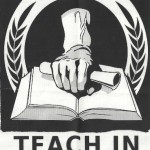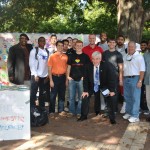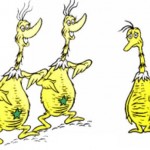At North Carolina State University, along with Americans around our nation, on Thursday, November 3rd, we held an Occupy-Wall-Street Teach-in.
    I was one of the speakers at the Occupy-NCSU Teach-in.  This is what I said:
   Long ago, sociologists made this discovery: when the economy gets bad people have a tendency to scapegoat; to blame other people. So people begin to say that “…things wouldn’t be like this if we didn’t have those ‘blanks’ around.â€
   And recently we have seen that happen. Hispanics, gays and lesbians, Muslims… they are bringing this country down. That’s the scapegoating tendency.
   But let’s think back to the success of the civil rights movement. Your generation has been taught and convinced that racism is in people. But that is not true.
   Racism is not in any person.
   I grew up in the Jim Crow South. I was not allowed to go to school with white kids… by law. That is racism; racism resides in the customs and structures of a society.
     Yes, there were men and women who engaged in violent, bigoted behavior; Bull Connor, Governor George Wallace. But the question is, how could that be; how could that happen?
  Well, individuals like Bull Connor were given free rein and power by the racial laws and customs of our society.  For that reason, the civil rights movement targeted institutions not individuals. The success of the civil rights movement was to ignore individual bigots and attack those racial laws and customs through the use of the U.S. Constitution.
   Turns out that now with Occupy-Wall-Street and Occupy-NCSU, Americans are on the right track. Yes Bernie Madoff was a bad man who cheated people.
   And just this week we appear to have a new individual culprit. Ex-New Jersey Governor Jon Corzine whose company MF Global filed for bankruptcy on Monday. Why?Â
   Corzine and his company lost 600 million dollars of their investors’ money. Somehow the money has disappeared they say. They just lost that money, they say. And now investors have once again been Madoffed. But let’s not scapegoat individuals.
   Putting Bernie Madoff in jail and putting Jon Corzine in jail will not rid of us the problem that allowed for a Bernie Madoff and a Corzine to do what they did. Still, don’t misunderstand me. Taking legal action against Bernie Madoff was right; it is right that he is in jail.
  But, I say again, putting Bernie Madoff in jail and putting Jon Corzine in jail will not rid of us the problem that allowed for a Bernie Madoff and a Corzine to do what they did. We have to attack the economic structures, the economic customs that set up Bernie Madoff and Jon Corzine. Those Wall Street customs support an attitude where money matters more than people.
   You need to know, for example, in the midst of the mess he created at MF Global Jon Corzine was trying to sell MF Global. He knew millions of dollars had gone missing. But he knew too that if he sold the company, he would be given 12 million dollars.
   Turns out, when he was hired to run the company, the contract given to him by the board of directors of MF Global guaranteed him 12 million dollars if the company was sold. It didn’t matter if that sale came because the company was failing.
   Where is the accountability for poor management of other people’s money?
   That’s just one of the common practices of Wall Street that is bringing our country down.
   And by the way, there is something else that smells funny. For some reason, with the Occupy Wall Street movement across this great nation… the police are sent to watch those gathered. That’s kind of odd in America… where we are guaranteed the right to peaceable assembly. Now, the police should show up if there is a reported incident, but not just because people have gathered to protest the practices of Wall Street.Â
   But that’s part of what’s going on. Too many of our institutions are being used to uphold the Wall Street way, but not the American Way.
   All that more reason that it’s time for us to push for changes in the economic and political structures, the economic and political customs that set up the Bernie Madoff’s of the world. Those Wall Street customs support an attitude where money matters more than good stewardship; where money matters more than people.
  It is time for us to push back against that. It’s time for us to force a change in that attitude and in those Wall Street customs.
  And keep in mind that this must be a sustained effort; it will not work if it’s a one-shot effort. As one writer has put it,
   “…Everything requires energy. We must put effort and energy into anything we wish to change.â€









